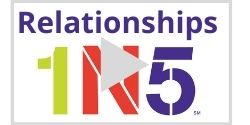
Explore resources for how to maintain healthy relationships:
All families are unique. Supporting families involves recognizing that they come in all shapes and sizes, with different needs and circumstances. Family members may not necessarily be biologically related or even live with the child or young person all the time. Some individuals may have one or several parents or caregiver, including grandparents, step-parents, same-sex parents, aunts and uncles, foster parents or adoptive parents.
In healthy family relationships, people trust and rely on each other for support, love, affection and warmth. Families often share common goals and work together to reach those goals. Family members feel safe and connected to one another. Strong family relationships also are a source of comfort, guidance, and strength that you can draw on in times of stress. Likewise, they provide a sense of belonging and unconditional love you are not likely to find anywhere else.
Articles
- Family Relationships: Parents, stepparents, grandparents, and guardians
- girlshealth.gov
- How to Have Healthy Family Relationships With Less Stress
- verywell mind
- Healthy Families
- be you
- Brothers and Sisters
- girlshealth.gov
- 7 Strategies to Deal with Difficult Family Members
- Abigail Brenner, M.D. – Psychology Today
- Relationships with Parents and Families: Why Teenagers Need Them
- raisingchildren.net
- Talking to Your Parents – or Other Adults
- TeensHealth
Books
- But It’s Your Family…
by Dr. Sherrie Campbell - Coping with Critical, Demanding, and Dysfunctional Parents
by David M. Allen - The Big Disconnect by Catherine Steiner-Adair EdD
- Parenting From Surviving to Thriving by Charles R. Swindoll
- Marriages, Families and Relationships: Making Choices in a Diverse Society by Mary Ann Lamanna, Agnes Riedmann & Sudan D. Stewart
- Breaking the Cycle of Hurtful Family Relationships by Robert S. McGee and Dale W. McClesky
- What They Don’t Teach Teens: Life Safety Skills for Teens and the Adults Who Care for Them by Jonathan Cristall
- Family Violence: Legal, Medical and Social Perspectives by Cliff Roberson and Paul Harvey Wallace
- The Family: Diversity, Inequality and Social Change by Philip N. Cohen
Toolkits/Activities
Videos
Organizations
A healthy friendship is one that is a positive influence in your life. It is a relationship that encourages you to be your best, supports you through good and bad times and allows you to blossom. An important part of any healthy friendship or relationship is the ability to talk and listen to one another. Friendships help people learn to listen and share their feelings. Friends feel safe together and are an important part of each other’s lives. Healthy friendships mean learning to respect and trust each other. Friends are respectful of who each other is and can be themselves around each other.
Organizations
Articles
- 10 Rules for Health Friendships
- Mallory Herrman
- Healthy vs. Unhealthy Friendships
- Dr. Jane Bluestein – Instructional Support Services, LLC
- Friendship and Mental Health
- National Alliance on Mental Illness (NAMI)
- Coping with Cliques
- Teens Health
- Making Good Friends
- HelpGuide
- Healthy Friendships and Relationships
- Connecticut’s Official State Website
- Friendships: Enrich your life and improve your health
- May Clinic
- Healthy Friendships
- Youth First
- Setting Boundaries with Friends Isn’t Easy, Here’s How to Do It
- MyDomaine
Toolkits/Activities
-
- Friendship Lessons, Worksheets and Activities
- Resources That Teach Kids to Build Healthy Friendships (Free Printables)
- Great Friendship Social Lessons from Around the Web: Something for Every Grade Level
- The Peer Pressure “Bag of Tricks” Role Playing Lesson
- Respect Effect: Do Cool Challenges with Friends – app
Videos
-
- 4 Differences Between Good Friends and Toxic Friends (5:32)
- Psych2Go
- What Teens Think About Healthy Relationships (2:03)
- My Health for Teens & Young Adults
- What Makes a Relationship Healthy? (2:16)
- National Alliance on Mental Illness (NAMI)
- 10 Differences Between Good Friends and Toxic Friends (5:30)
- Bright Side
- Healthy v. Unhealthy Relationships (2:16)
- AMAZE Org
- Working Toward Healthy Relationships (2:54)
- Dr. Ann-Louise Lockhart
- Four Types of Boundaries – Healthy Relationships (3:37)
-
- Dr. Ashley Solomon
-
Books
-
- The Teen Girl’s Survival Guide: Ten Tips for Making Friends, Avoiding Drama, and Coping with Social Stress
by Lucie Hemmen, PhD
- The Friendship Formula
by Kyler Shumway, MA - Chicken Soup for the Teenage Soul: The Real Deal Friends: Best, Worst, Old, New, Lost, False, True and More
by Jack Canfield, Mark Victor Hansen & Deborah Reber - Peer Pressure vs. True Friendship! Surviving Junior High: A self help guide for teens, parents & teachers
by Orly Katz - I Hear You: The Surprisingly Simple Skill Behind Extraordinary Relationships
by Michael S. Sorensen
- The Teen Girl’s Survival Guide: Ten Tips for Making Friends, Avoiding Drama, and Coping with Social Stress
- 4 Differences Between Good Friends and Toxic Friends (5:32)
Being part of a community gives us a sense of belonging. It enables us to share personal relatedness and support perpetual growth of each other, ourselves and our environment. Community relationships embrace spirit, character, image and pride and are a vital element of a healthy community. It is a feeling that people within the community matter to one another with a shared faith that their needs will be met through commitment and togetherness. Being a part of a community can make us feel as though we are a part of something greater than ourselves. Community relationships provide unique opportunities for people to learn from each other. They give support and encouragement and are an invaluable part of joining forces with our peers.
Organizations
Articles
- Fostering Intergroup Contact in Diverse Schools
- The Century Foundation
- Learning by Design: Inclusive Relationships
- Meteor Education
- The Importance of Building a Diverse Community
- Think Bilingual
- Community Relationships and Resources
- Impact on Health & Wellness
- Native American Communities
- love is respect
- The Value of Inclusive Education
- Open Society Foundations
- Getting Along with Your Teachers
- Teens Health
Like other relationships in our lives, romantic relationships play an important role in fulfilling our needs for intimacy and social connection. Humans have an inherent need to build relationships, and when these relationships are healthy it can lead to better mental health and emotional wellbeing. A positive relationship can be shared between any two people who support, love, and encourage each other. Being in a loving and healthy romantic relationship can give a person a sense of purpose and fulfillment.
If you are concerned that your or someone you know is in an unhealthy relationship here are hotlines that are free, private and available 24 hours per day:
National Sexual Assault Hotline 1-800-656-HOPE (1-800-656-4673)
National Domestic Violence Hotline 1-800-799-SAFE (1-800-799-7233)
ChildHelp USA National Child Abuse Hotline 1-800-4-A-CHILD (1-800-422-4663)
Love is Respect 1-866-331-9474 (1-866-331-8453 TTY).
Organizations
- Let’s Be Real
- Love Is Respect
- Trevor Space: an affirming international community for LGBTQ young people (13-24)
- PFLAG (diversity is celebrated and all people are respected, valued, and affirmed inclusive of their sexual orientation, gender identity, and gender expression)
Articles
- What Makes a Dating Relationship Healthy for Young People?
- Parent Tips for Helping Your Teen Set Boundaries with Their Dating Partner
- 10 Signs of Healthy vs. Unhealthy Relationships
- Relationships: Healthy and Unhealthy
- Safety in Relationships
- Parents: How to Help Your Teen Set Healthy Dating Boundaries
- Characteristics of Healthy & Unhealthy Relationships






